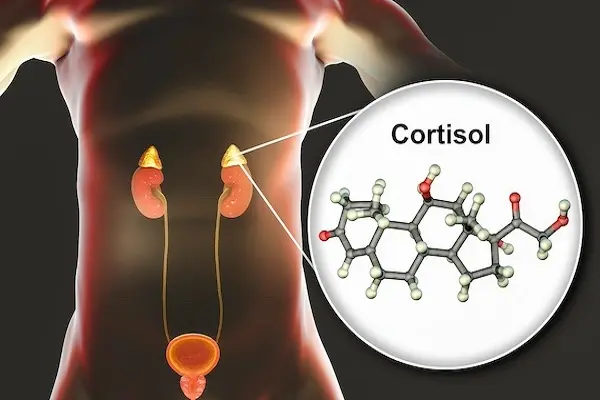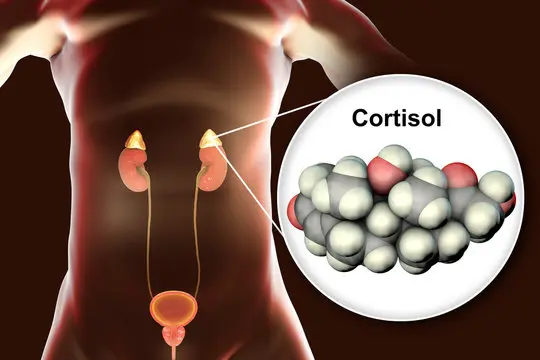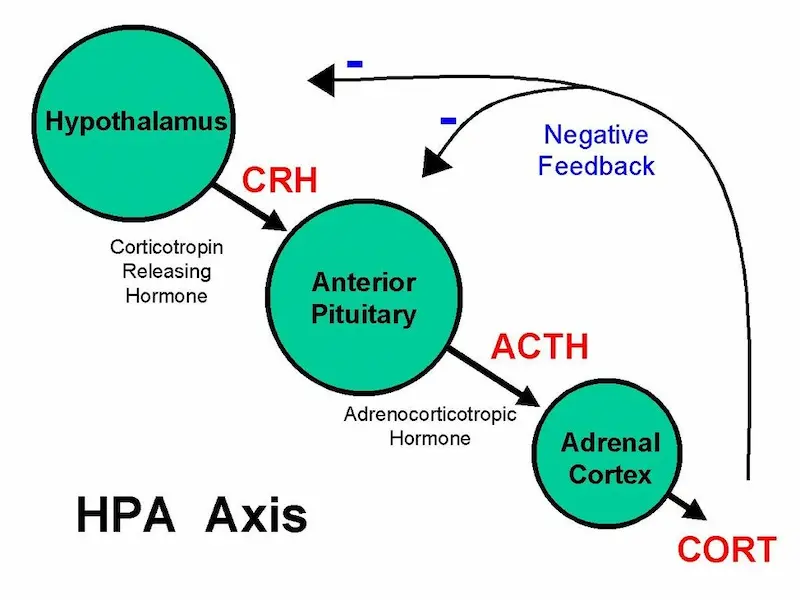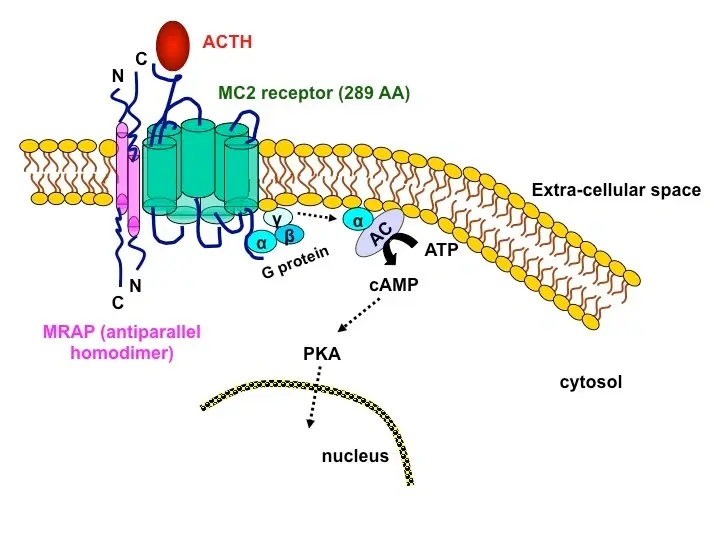
PROMO!
First order? Get 10% OFF with this code: 1storder
Written by

GHRP-2 is a research peptide used to study how the body regulates hormones. It works by stimulating the pituitary gland, which plays a key role in controlling hormone release.
This stimulation can increase growth hormone (GH), adrenocorticotropic hormone (ACTH), and sometimes cortisol levels.
Research shows that GHRP-2 can temporarily raise cortisol levels in lab tests, but only for research purposes and not for human use. Peptide Works supplies GHRP-2 globally, strictly for research use only.
Understanding this effect requires examining the hormone responsible for signaling cortisol production ACTH.
Explore GHRP-2 from Peptide Works, a growth hormone secretagogue studied for its ability to stimulate ACTH and elevate cortisol levels.

ACTH, also known as adrenocorticotropic hormone, is released by the pituitary gland and is a major signal for cortisol production. When ACTH reaches the adrenal glands, it stimulates them to release cortisol into the bloodstream.
ACTH triggers cortisol release by stimulating the adrenal glands once it reaches them. This mechanism plays a vital role in regulating stress, metabolism, and immune function. Peptides such as GHRP-2, Ipamorelin, and Hexarelin are investigated for their potential to enhance ACTH production.
Understanding how ACTH helps to raise cortisol levels guides research into hormone balance, adrenal health, and endocrine regulation in research.
ACTH’s signal, however, must be received and acted upon. This is where the adrenal glands play a critical role.
Discover Ipamorelin from Peptide Works, a selective peptide known for promoting GH and ACTH release without significantly affecting prolactin or cortisol spikes.
The adrenal glands play a central role in how the body can raise cortisol levels, which is vital for managing stress and metabolism.
When ACTH from the pituitary gland signals the adrenal cortex, the glands respond by increasing cortisol production.
Research shows that peptides such as GHRP-2, Ipamorelin, and Hexarelin can stimulate ACTH release, helping raise cortisol levels effectively. Studies on this process are important for understanding hormone balance and peptide functions in the body.
Beyond external stimulation, the body has its own internal conditions that can trigger cortisol production.
Checkout Hexarelin from Peptide Works, a potent synthetic peptide shown to boost growth hormone and ACTH levels, aiding cortisol regulation studies.

The body raises cortisol levels naturally in response to stress, low blood sugar, and changes in the sleep cycle. Cortisol helps manage energy and immune function during these times.
Activity, temperature changes, and infections also trigger cortisol release. Research shows peptides like GHRP-2, Ipamorelin, and Hexarelin can affect these natural processes by increasing ACTH, which then signals the adrenal glands to raise cortisol levels.
Understanding what causes the body to raise cortisol levels helps researchers study how stress and peptides influence hormone balance.
Among these triggers, stress is one of the most significant and frequently studied.
Stress causes the body to raise cortisol levels through a complex system involving nerves and hormones. This hormone helps the fight-or-flight response by providing energy and boosting metabolism.
The pituitary gland controls ACTH, which signals the adrenal glands to release cortisol. Chronic stress can cause the body to keep cortisol levels high, which may harm health.
Cortisol also balances immune functions and inflammation during stress. Understanding the stress and cortisol relationship is key to managing health risks linked with high cortisol.
This interaction relies on specific receptors and molecular signals that convert ACTH’s presence into cortisol production.

ACTH, a peptide hormone produced by the pituitary gland, binds to melanocortin 2 receptors (MC2R) on adrenal cortex cells. This triggers intracellular signaling pathways such as cAMP/PKA, leading to the activation of enzymes that synthesize cortisol.
The process includes both rapid effects, like cholesterol mobilization, and longer-term gene transcription, supporting cortisol production.
This ACTH-driven pathway, involving cAMP and protein kinase A, is also influenced by GH secretagogues, which enhance upstream pituitary signaling.
Understanding ACTH signaling clarifies how the body controls cortisol levels in stress and other conditions.
Central to this response is MC2R, the receptor that initiates cortisol synthesis once ACTH binds to it.
The melanocortin 2 receptor (MC2R) is a key protein found on adrenal cortex cells. It binds ACTH, which sets off a chain reaction that helps produce cortisol.
This process relies on cAMP and protein kinase A to activate enzymes and start gene transcription. With elevated ACTH, MC2R receptors become activated on adrenal cells initiating the biochemical cascade needed for cortisol synthesis.
This step is indirectly modulated by certain research peptides. At Peptide Works, we supply these peptides for research, supporting new advances in hormone regulation and health science.
These mechanisms are shaping the direction of current and future peptide-based research.
Peptides like GHRP-2, Ipamorelin, and Hexarelin help research how to raise cortisol levels through hormone pathways.
By targeting hormone regulators like ACTH and adrenal receptors, these peptides open up new research avenues in hormonal therapy and stress-related disorders.
Peptide Works supplies high-quality peptides for science and research. Ongoing studies will improve what we know and may lead to new treatments. These could help manage health problems related to cortisol.
All products discussed are supplied for research purposes only and are not intended for human use.
[1] Arvat E, di Vito L, Maccagno B, Broglio F, et al. Effects of GHRP-2 and hexarelin, two synthetic GH-releasing peptides, on GH, prolactin, ACTH and cortisol levels in man. Comparison with the effects of GHRH, TRH and hCRH. Peptides. 1997;18(6):885-91.
[2] Kimura T, Shimatsu A, Arimura H, Mori H, et al. Concordant and discordant adrenocorticotropin (ACTH) responses induced by growth hormone-releasing peptide-2 (GHRP-2), corticotropin-releasing hormone (CRH) and insulin-induced hypoglycemia in patients with hypothalamopituitary disorders: evidence for direct ACTH releasing activity of GHRP-2. Endocr J. 2010;57(7):639-44.
[3] Ghigo E, Arvat E, Ramunni J, Colao A, et al. Adrenocorticotropin- and cortisol-releasing effect of hexarelin, a synthetic growth hormone-releasing peptide, in normal subjects and patients with Cushing’s syndrome. J Clin Endocrinol Metab. 1997 Aug;82(8):2439-44.
[4] Arvat E, Ramunni J, Giordano R, Maccagno B, et al. Effects of the combined administration of hexarelin, a synthetic peptidyl GH secretagogue, and hCRH on ACTH, cortisol and GH secretion in patients with Cushing’s disease. J Endocrinol Invest. 1999 Jan;22(1):23-8.
[5] Raun K, Hansen BS, Johansen NL, Thøgersen H, et al. Ipamorelin, the first selective growth hormone secretagogue. Eur J Endocrinol. 1998 Nov;139(5):552-61.
ALL CONTENT AND PRODUCT INFORMATION AVAILABLE ON THIS WEBSITE IS FOR EDUCATIONAL PURPOSES ONLY.
DISCLAIMER: These products are intended solely as a research chemical only. This classification allows for their use only for research development and laboratory studies. The information available on our Peptide Works website: https://peptide-works.com/ is provided for educational purposes only. These products are not for human or animal use or consumption in any manner. Handling of these products should be limited to suitably qualified professionals. They are not to be classified as a drug, food, cosmetic, or medicinal product and must not be mislabelled or used as such.
Peptide Works
Related Articles

What are the Best Cognitive Peptides?
Cognitive peptides are short chains of amino acids that researchers are exploring for their potential effects on brain function. They

Achieving increased skin pigmentation without prolonged sun exposure has been demonstrated with Melanotan peptides in research. Two commonly studied options,

Can PTD-DBM Hair Growth Peptide Stop Balding?
Hair thinning and balding affect millions worldwide, often leading to frustration and limited options. This challenge has driven researchers to